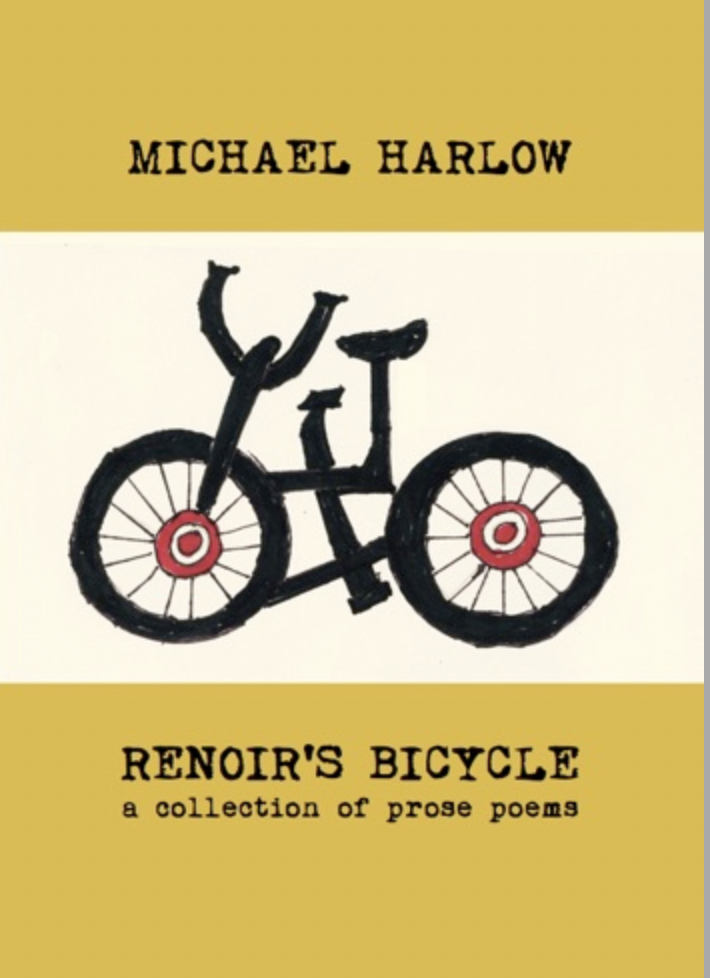Renoir’s Bicycle: a collection of prose poems, Michael Harlow, Cold Hub Press, 2022
Michael Harlow’s new collection delivers a poem grove of contemplation. I keep sinking into individual poems and taking up residency. There is sweet alchemy between the visual and the aural. Repeating motifs form threads that offer connections, enhance a rich gathering. I am thinking of light dark love death life song. The notion that poetry becomes song, and stands in as musical score is important. You could say the poetry becomes love light dark death life. There is an insistence of song, the audibility of music, the stretchiness of chords.
The collection gets me thinking about poetry as both maker and made, as dreamer and dreamed: ‘Poems live / beyond where dreams were born’ (from ‘the living girl’). It’s poetry as protagonist. How poems live on the page – in the ear, in the mind, in the pen – promotes endless speculation.
Michael has created a poem grove where the abstract dwells alongside the tangible. Hands, names and water are as important as the unspeakable, the knowing, the speakable. The ideas are philosophical rather than political, although I say that hesitantly, knowing there is a political edge to everything. But I am jamming on a notion; unknowing becomes not knowing and then I opt for beknowing. Playfully. I am investing the poem grove in variations of becoming: beseeing, be-ending, bebeginning, bespeakable.
This is the joy of poetry. Who knows how it becomes you?
We enter a peopled grove: Dante Alighieri, Jean Renoir, Mary Oliver, Sappho, Gertrude Stein, President Lincoln. Such arrivals suggest the collection can also be experienced as narrative with beginnings, middles, endings, scenes and settings, incident and epiphany, turning points and story arcs.
Renoir’s Bicycle is a satisfying read on so many levels. One niggle: I do advocate for larger fonts (there is a trend at the moment to go tiny) because those of us with impaired vision find small fonts difficult to read. That said, I loved spending prolonged time within the rich rewards of Michael’s poem grove.
Out of the rondeaux of astonishments the dark
sea and the green sea, starfish blooming at your wrist;
on the dark road under star-fall pools of far light
more near, out of the loneliness the cold touch of
loneliness; alone and not alone in the known world.
The descending dark with its haunting shadows,
how death makes living, makes loving more loveable;
out of the canticles of the poetry of song, and the song
of poetry everywhere in the natural world, the swell
of joy and laughter, cloud cast moments that make light
and dark a wonder.
from ‘Mary Oliver, Poet’
Michael Harlow has published twelve books of poetry, including Cassandra’s Daughter (2005, 2006), The Tram Conductor’s Blue Cap (a finalist in the 2010 New Zealand Book Awards), Sweeping the Courtyard, Selected Poems (2014), Heart Absolutely I Can (2014), Nothing For It But To Sing (2016, winner of the Otago University Press Kathleen Grattan Award) and The Moon in a Bowl of Water (2019). Take a Risk, Trust Your Language, Make a Poem (1986) won the PEN/NZ award for Best First Book of Prose. Residencies he has held include the Katherine Mansfield Memorial Fellowship and the Robert Burns Fellowship. In 2014 he was awarded the Lauris Edmond Memorial Prize for Distinguished Contribution to New Zealand Poetry, and in 2018 he received the Prime Minister’s Award for Literary Achievement in Poetry.
Cold Hub Press page

